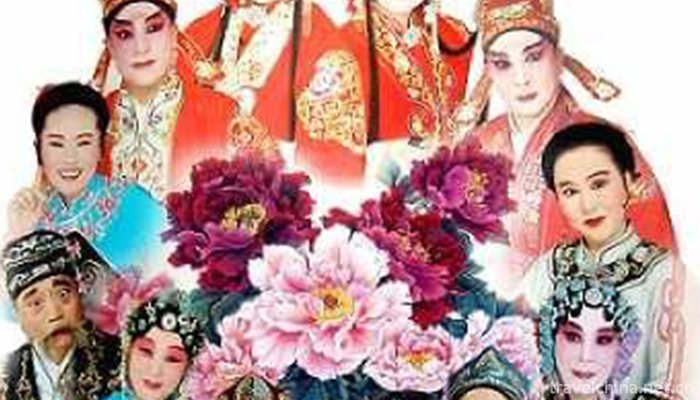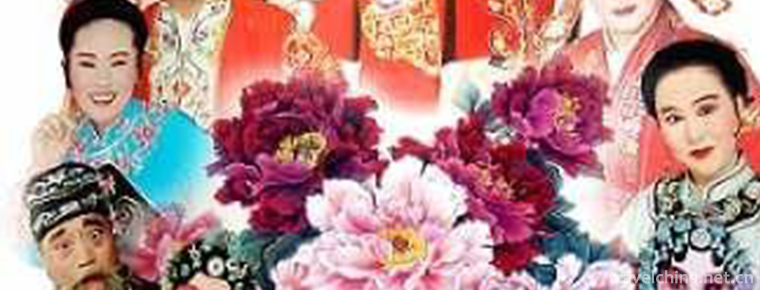Ping Ju Opera
Ping Ju Opera
Opera commentary is a kind of opera which is spread in the north of China. It is one of the most popular operas among the people and ranks among the five major Chinese operas. Some people once thought that it was the second largest drama in China. At the end of the Qing Dynasty, it was formed on the basis of the song "Counterpart Lotus Fall" in Luanxian County, Hebei Province. It first became popular in rural areas of Hebei Province, and then entered Tangshan, which was called "Tangshan Fall Zi". In the 1920s or so, a group of actresses appeared in Northeast China. After the 1930s, under the influence of Beijing Opera and Hebei Bangzi Opera, the performance of opera evaluation has matured gradually, and there have been schools of Li Jinshun, Liu Cuixia, Baiyushuang, Xicailian, Ailian Jun and so on. Since 1950, plays such as "Little Son-in-law", "Liu Qiaoer", "Flowers as the Matchmaker", "Yang Sanjie's Report", "Qin Xianglian" have exerted great influence throughout the country, with the emergence of famous actors such as Xinfengxia, Xiaobaiyushuang and Wei Rongyuan. Nowadays, opera critics are still popular in North China and Northeast China.
Opera critics are divided into East Road and West Road, while East Road Opera critics are the main ones.
On May 20, 2006, the opera evaluation was approved by the State Council and listed in the first batch of national intangible cultural heritage list.
In December 2018, the General Office of the Ministry of Education announced that Tangshan Teachers College was the base for the inheritance of excellent traditional Chinese culture.
Orion of the Name
Judging opera is known as "skipping opera" or "falling opera", as well as "flat-tuned Bangzi opera", "Tangshan Luozi", "Fengtian Luozi", "Ping opera" and "Judging opera", but eventually it is well-known throughout the country as "Judging opera". The origin of the name "opera commentary" is not uniform. One way of saying is that the name originated from Li Jinshun, an early famous actress. Another way of saying is that the name originated from Li Dazhao. When the opera critics, who were small operas at that time, entered the city stage, they both called Peking Opera "Peace Opera" with the National Grand opera, which aroused the jealousy of the masters of Peking Opera troupes, and they provoked trouble among the martial opera actors. Later, Li Dazhao, who was working in the press, came to mediate. He came up with an idea to add a word to Pingju. He said that Peking Opera is a national opera, and Peking Opera is called Ping Opera on behalf of Peking Opera; Peking Opera is a folk opera, which reflects the social reality quickly, sings in a simple form and is easy to understand. Adding a word "Ping" to a word "Yan" becomes "comment", which means to comment on society, comment on books and talk about singing. There are also views that when Zhaocai et al. transformed the lotus flower into "Tangshan Luozi", they absorbed the complete set of musical instruments of Hebei Bangzi. They named the new opera "Jingdong First Pingqiang Bangzi Opera", "Pingju Opera" for short, and used the script voice in singing. At that time, the representative actors were Yue Mingzhu, Jin Kaifang and so on. After the Revolution of 1911, Beijing was renamed Peiping, and Peking Opera was also called Peking Opera. At this time, the "Pingju" led by Cheng Zhaocai has developed to Tianjin and other places, and the trend of the renamed "Pingju" by Peking Opera has become a pair. Hence, it was named opera commentary, which embodies the meaning of "commenting on the past and discussing the present". Another view is that when the skipping play was performed in Shanghai in 1935, it was renamed "opera commentary" after adopting the suggestion of famous resident Lu Hailian because of the new ideas of "punishing evil and promoting good" and "commenting on the past and the present". In 1936, when Bai Yushuang made the film "Begonia Red" in Shanghai, the name of "opera commentary" was first published in Ta Kung Pao by the press. Since then, the name of opera commentary has been widely spread throughout the country.
Drama Festival
Opera commentary is one of the traditional operas with a long history and broad mass base in China. Established in 2000, the China Drama Festival is an annual large-scale national drama festival co-sponsored by the Art Department of the Ministry of Culture, the Hebei Provincial Department of Culture and the Tangshan Municipal People's Government. Since the fourth session, it has been held every two years. The host is located in Tangshan City, Hebei Province, the birthplace of opera evaluation.
The purpose of the Chinese Drama Festival is to inherit, develop and carry forward the art of drama evaluation, and constantly expand its influence at home and abroad. The festival includes the selection and performance of excellent plays, the convening of seminars on theatrical evaluation art, and the organization of theatrical competition and theatrical film exhibition week for theatrical enthusiasts. The Festival pays great attention to the times and the participation of the masses. Since the third festival, it has continuously strengthened its integration with economic activities, contributing to the promotion of national culture, the promotion of artistic exchanges and the promotion of the development of the art of theatrical evaluation.


-
1.Mandarin Oriental Hotel Guangzhou
Wenhua Oriental Hotel is located in Tianhe District of Guangzhou, which belongs to Wenhua Oriental Hotel Group. It is a five-star hotel. The hotel has 233 rooms and 30 suites, and 24 hotel-style servi
Time 2018-12-16 -
2.Guilin Yaoshan Scenic Area
Yaoshan is located in the eastern suburb of Guilin City, 8 kilometers away from the city center. The main peak is 909.3 meters above sea level and 760 meters above sea level. It is the highest peak in
Time 2019-01-13 -
3.Liao Zhai City
Liaozhai City was invested and built by Pujiazhuang, Zichuan. It is a large-scale famous garden scenic area with gardens as its manifestation and Liaozhai stories as its theme
Time 2019-01-30 -
4.Carrying a number
Handling trumpets is one of the trumpets of traditional folk songs. It is popular in many fields, such as manual workers, such as loading and unloading, lifting, pushing and pulling goods.
Time 2019-04-03 -
5.Dai opera
Dai Opera, one of the national intangible cultural heritage, is a traditional drama in Jingpo Autonomous Prefecture of Dai Nationality in Dehong, Yunnan Province.
Time 2019-04-23 -
6.Pile brocade
Duijin, also known as Shangdang Duijin, is a handicraft hand Duijin is developed on the basis of traditional Chinese painting and embroidery. It is made of silk as the main fabric
Time 2019-04-28 -
7.Lantern Opera
Flower lantern opera is a kind of traditional opera widely popular in China. Its prominent feature is that the hands are inseparable from fans and handkerchiefs, singing and dancing
Time 2019-05-04 -
8.Sun Bin quan
Sun Bin Quan is an ancient and rare traditional boxing in Shandong Province. Its connotation is broad and profound, which was created by Sun Bin, a military strategist in the Spring and Autumn Period
Time 2019-06-17 -
9.Tujia Waving Dance
Hand-waving dance is an ancient traditional dance of Tujia nationality. It mainly spreads in the Youshui River and Wujiang River basin at the junction of Hubei, Hunan, Chongqing and Guizhou. It mainly
Time 2019-06-23 -
10.Beijing University of Chinese Medicine
Beijing University of Traditional Chinese Medicine is a national key university with traditional Chinese medicine as its main subject. It is directly under the management of the Ministry of Education.
Time 2019-09-22 -
11.Yulei mountain
Yulei mountain, according to the original note of "Mian County" in the book of geography of Han Dynasty, "the water of Yulei mountain flows from southeast to Jiangyang and enters into the river." In Shuo Wen, the word "Yu" is written as "the water flows out of Sichuan county, Mian Yu Lei, Shandong Province, and enters the river in the south of Shandong Province
Time 2020-11-08 -
12.Meishan peoples life
In 2019, the per capita disposable income of urban residents is 36743 yuan, an increase of 9.0%. The per capita consumption expenditure of urban residents was 23554 yuan, an increase of 12.0%; the per capita disposable income of rural residents was 18177
Time 2020-12-18